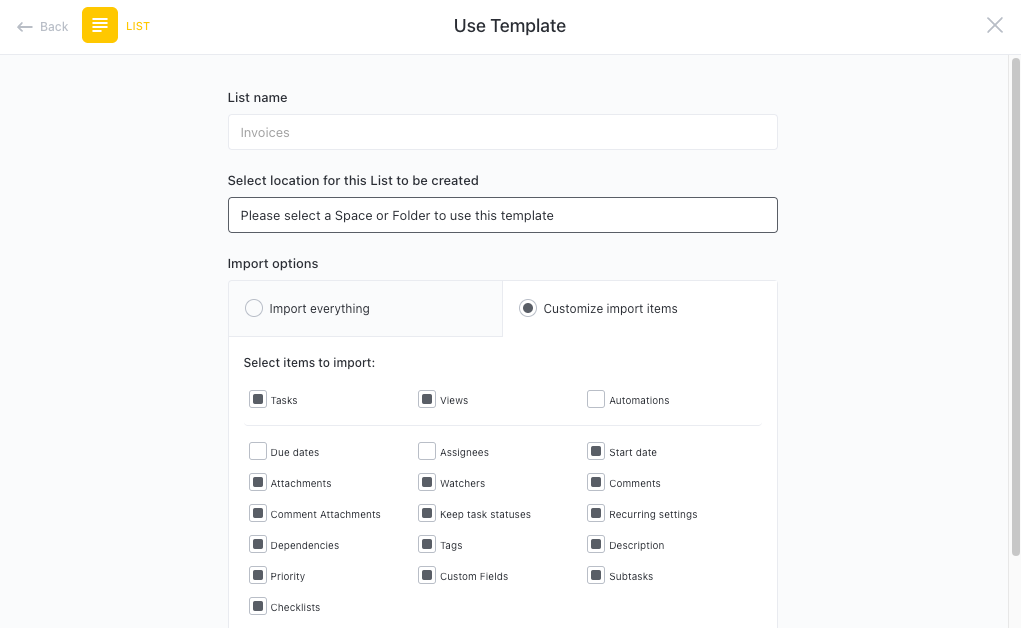Whether you're acquiring a new business or entering into a partnership, conducting thorough financial due diligence is essential. But the process can be overwhelming and time-consuming, especially when it comes to defining the scope of work. That's where ClickUp's Financial Due Diligence Scope of Work Template comes in to save the day!
This template is designed to help you:
- Clearly define the scope of your financial due diligence project
- Identify the key areas to investigate, such as financial statements, tax compliance, and potential risks
- Streamline collaboration with stakeholders and team members
- Ensure that all necessary tasks are completed on time and within budget.
With ClickUp's Financial Due Diligence Scope of Work Template, you'll have all the tools you need to conduct a comprehensive analysis and make informed decisions with confidence. Get started today and take control of your due diligence process!
Benefits of Financial Due Diligence Scope of Work Template
When it comes to financial due diligence, having a clear scope of work is essential. With the Financial Due Diligence Scope of Work Template, you can:
- Streamline the due diligence process by outlining the specific tasks and objectives
- Ensure consistency and accuracy by providing a standardized framework for conducting financial analysis
- Save time and effort by eliminating the need to create a scope of work from scratch
- Improve communication and collaboration among team members involved in the due diligence process
- Enhance decision-making by providing a comprehensive overview of the financial aspects of a potential investment or acquisition.
Main Elements of Financial Due Diligence Scope of Work Template
ClickUp's Financial Due Diligence Scope of Work template is designed to streamline your financial due diligence process. Here are the main elements of this Doc template:
- Custom Statuses: Use custom statuses to track the progress of each task in your financial due diligence process, such as In Progress, Completed, and Pending Review.
- Custom Fields: Utilize custom fields to capture important information related to your financial due diligence, including Company Name, Financial Statements Review, Risk Assessment, and more.
- Different Views: Access different views to visualize and organize your financial due diligence tasks. Some of the available views include Document Outline, Table of Contents, and Full-Screen mode, allowing you to navigate and review your scope of work efficiently.
With ClickUp's Financial Due Diligence Scope of Work template, you can effectively manage and document your financial due diligence process, ensuring a thorough and organized approach.
How to Use Scope of Work for Financial Due Diligence
When conducting financial due diligence, it's crucial to have a clear and comprehensive scope of work. Here are four steps to effectively use the Financial Due Diligence Scope of Work Template in ClickUp:
1. Define the objectives and requirements
Start by clearly defining the objectives of the financial due diligence process. Determine what you need to achieve and the specific requirements you have for the project. This could include reviewing financial statements, analyzing financial ratios, assessing cash flow, identifying potential risks, and more.
Use custom fields in ClickUp to outline the objectives and requirements for each section of the scope of work.
2. Identify the key areas to investigate
Next, identify the key areas that need to be investigated during the financial due diligence process. This could include analyzing the company's financial performance, assessing the accuracy of financial statements, evaluating the effectiveness of internal controls, reviewing tax compliance, and examining any potential legal or regulatory issues.
Create tasks in ClickUp to outline each key area and assign team members responsible for investigating them.
3. Develop a timeline and milestones
To ensure that the financial due diligence process stays on track, it's essential to develop a timeline with clear milestones. Break down the project into smaller tasks and assign deadlines for each one. This will help you manage your time effectively and ensure that all necessary steps are completed within the desired timeframe.
Use the Gantt chart in ClickUp to visualize the timeline and milestones for the financial due diligence process.
4. Collaborate and communicate with stakeholders
Throughout the financial due diligence process, it's crucial to collaborate and communicate effectively with all relevant stakeholders. This includes the company being evaluated, internal team members, external consultants, and any other parties involved. Regularly update stakeholders on the progress of the due diligence and address any questions or concerns they may have.
Utilize the Docs feature in ClickUp to create a central repository for all project-related documents and facilitate collaboration and communication among stakeholders.
By following these steps and utilizing the Financial Due Diligence Scope of Work Template in ClickUp, you can effectively plan and execute a thorough financial due diligence process.

Get Started with ClickUp's Financial Due Diligence Scope of Work Template
Finance professionals and auditors can use this Financial Due Diligence Scope of Work Template to streamline their due diligence process and meet client requirements.
First, hit “Get Free Solution” to sign up for ClickUp and add the template to your Workspace. Make sure you designate which Space or location in your Workspace you’d like this template applied.
Next, invite relevant members or guests to your Workspace to start collaborating.
Now you can take advantage of the full potential of this template to conduct thorough financial due diligence:
- Utilize the Checklist View to track all necessary steps for the due diligence process
- Use the Gantt Chart View to plan and visualize the timeline of the project
- The Board View will help you keep track of different stages of the due diligence process
- The Document View is handy for storing and accessing important financial documents
- Organize tasks into different categories based on the area of focus, such as financial statements, tax compliance, or internal controls
- Assign tasks to team members and set due dates to ensure timely completion
- Regularly communicate with the client and provide them with progress updates
- Monitor and analyze tasks to ensure all required information is obtained for a comprehensive report









